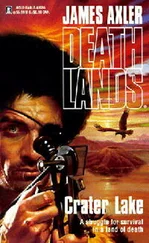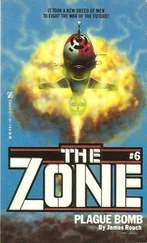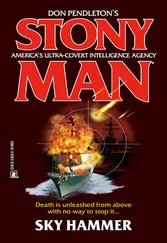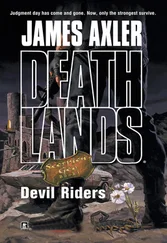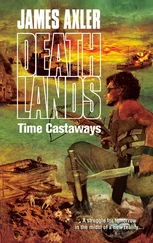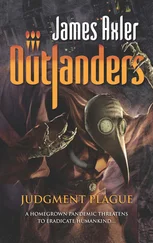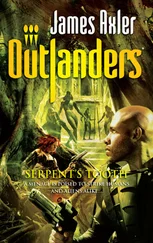1 ...6 7 8 10 11 12 ...15 Until that moment, only droolies had taken the Fire Talker’s stories seriously.
“How long ago?” someone along the shore had shouted back.
“Four days.”
“Stop!” the islanders cried. “Stop! Heave to!”
The sloop continued coasting east, the captain steering with one hand and holding the megaphone in the other.
“Are the pirates coming this way?” Okie had bellowed, running along the sand to keep up.
“Who knows?” was the reply. “Could be a day behind, or three hours behind. Or mebbe they took their spoils south. Not sticking around to find out. If you got any brains, you won’t, either.” The skipper tossed down the megaphone, and to his waiting crew he snarled the order “Up sail!”
The sheets filled with a resounding whipcrack and the ship accelerated away. The captain never once looked back.
The three predark vessels moored in the cove began immediate, frantic preparations to weigh anchor. Ignoring the shouts and curses of the islanders, the ships’ crews had pushed half-loaded dinghies from the beach and rowed away. The only evacuation on the traders’ minds was their own. As soon as the dinghies had been hoisted aboard, without even stowing cargoes belowdecks, the two battered Tartans and the Catalina winched up their hooks, raised all sails and left the Padre Islanders to meet their fate.
After the observation and blasterposts that ringed the perimeter had been alerted, the heads of the Nuevo-Texican founding families and their lieutenants, Okie included, met in emergency session in the Yoko Maru’s windowless galley. They had planned to dump the Fire Talker on the mainland shore that very day. Now they didn’t dare. There were unanswered questions about how he had managed to reach Padre so quickly on foot. If he was a pirate spy, and they turned him loose, he could report back on the island’s fortifications and armament. Some of the headmen wanted to chill him at once, just to be safe, but when a vote of hands was taken they were in the minority. The majority decided it was better to keep him alive and close, as he might give away an impending attack, either inadvertently or under torture.
The Nuevo-Texicans had beaten back invaders on many occasions in their short, violent history, usually before the bastards even set foot on the beach. Streams of triangulated blasterfire from strategically placed blasterposts took an unholy toll on shore landings. The islanders were proud of their fighting spirit and resilience; moreover, they were supremely confident in their battle prowess. Their chip-on-the-shoulder attitude, borrowed from their nuke-fried ancestors, was “Bring it on!” Though they lived amid the unthinkable consequences of that philosophy, the irony was lost on them.
The threat of long-distance shelling by the Matachìn meant their normal defensive tactics went out the window. They couldn’t count on the blasterposts surviving a high-explosive barrage from offshore. The only hardened, defensible structure on the island was the cargo ship itself. In stacked containers and vast belowdecks holds, it held virtually all of the islanders’ wealth.
After a brief discussion, the headmen had decided that if and when the enemy was sighted, they would withdraw the island’s population to the freighter, and make the attackers take it, deck by deck, bulkhead by bulkhead. If the Matachìn shelled the ship to break the resistance, they’d destroy everything they came for, and waste precious ammunition in the process.
Absentmindedly scratching an angry cluster of mosquito bites on the inside of his wrist, Okie turned on the platform and gazed down on the foredeck, at lines of people carrying valuables and food into the ship, and heading back empty-handed for more. A natural incline made of compacted, wind-driven sand led from the beach to the portside gangway. Before the pirates landed, and after everyone was on board, they would blow it up, forcing the Matachìn to use grappling hooks and ladders to reach the top deck. Which would put them squarely into the kill zones of the firing ports staggered along the hull. The narrow slits hacked into the steel were just big enough for ramp and post sights and blasterbarrels.
Looking down over the crow’s nest rail, feeling the rickety platform sway under him in the wind, Okie had an awful surge of vertigo. Heights normally never bothered him; they certainly never made him want to vomit. Putting it down to too little sleep and food, and too much frantic activity, he shut his eyes for a moment and concentrated on breathing deeply and evenly through his mouth.
When the whirling sensation passed, Okie once again peered through the binocs, scanning the lines of people filtering between stacked cargo containers for his two hugely pregnant wives. He didn’t see either of them, or any of his six kids. Everybody who could fire a blaster was carrying one. Women and the older children wore AKs and sawedoff pump shotguns slung across their backs. There were no tear-streaked faces, no quivering lower lips. The islanders, to a person, were jut-jaw defiant.
They had all heard other Fire Talkers’ stories about the Matachìn, selected, fragmented details that were, of course, calculated to entertain and raise the short hairs. There was no way of telling if any of them were true, or how much the facts had been exaggerated.
It was rumored that the pirates all carried machetes with razor-sharp cane hooks at their tips—gut rippers. It was said they used the heavy blades to chop off any hands raised against them. After cauterizing the fresh stumps with torches so their captives wouldn’t bleed to death, they nailed the severed appendages in pairs to the ramparts of conquered villes, palm outward in a gesture and symbol of permanent submission.
It was rumored that they made the subjected people kneel whenever they passed, kneel with noses and foreheads pressed firmly into the dirt. It was said they wore glittering garlands of looted gold jewelry entwined in their matted dreadlocks and around their scarred boot tops. Apparently, they never washed themselves, either.
Never.
Stink was their religion. Pong was their manifesto.
According to the stories, some of the Matachìn wore bright, floral frocks over their blood-stained trousers and boots, shoulder-seam–split trophies ripped from the women they had ravaged and murdered.
According to the Fire Talkers, the Matachìn indulged in bloody and brutal ritual spectacles; they had established an extensive slave trade along the Atlantic coast of Mexico and Central America; they worked their captives to death in their agricultural fields and gaudies; and to amuse themselves during long sea voyages the pirate crews choreographed and staged slave fights to the death.
The common denominator in all the Fire Talker variations was death, unpleasant and prolonged.
Down in the ville, islanders were still gathering up everything of value, including excess stockpiles of food and fresh water. The water they couldn’t move, they dumped onto the sand. The idea was to leave the pirates nothing to eat or drink. The Nuevo-Texicans were well prepared for a long siege. They had the entire storehouse of the Yoko Maru at their disposal. The pirates had only whatever they brought along with them. Assuming the islanders could hold the ship for the duration, sooner or later problems of resupply would drive the Matachìn back to whatever hell-hole had spawned them.
The possibility did exist that the pirates had taken their fill of spoils in Browns ville, that they weren’t coming north, after all. But that wasn’t something the islanders could count on. Even as the residents crisscrossed between the ville and the Yoko Maru, explosive charges were being laid in the narrow, winding paths between the shanties. The predark Claymore mines with their payloads of steel ball bearings wouldn’t be trip-wired and armed until the enemy came into view and the last of the women and children were safely onboard the ship.
Читать дальше

